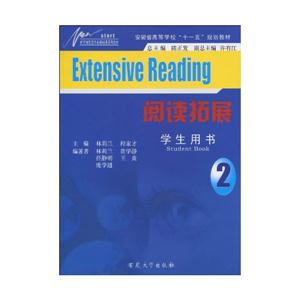-
>
西班牙语词根宝典
-
>
英语大书虫世界经典名译典藏书系:中国人的精神 (英汉对照)(精选权威版本)
-
>
许渊冲译唐诗三百首:汉文·英语
-
>
四级词汇词根+联想记忆法:乱序版
-
>
The secret garden
-
>
英国文学名篇选注
-
>
许渊冲译千家诗
阅读拓展:2:学生用书:Student book 版权信息
- ISBN:9787811107203
- 条形码:9787811107203 ; 978-7-81110-720-3
- 装帧:暂无
- 册数:暂无
- 重量:暂无
- 所属分类:>>
阅读拓展:2:学生用书:Student book 本书特色
《阅读拓展(学生用书2)》为新开端英语专业基础课系列教材,安徽省高等学校“十一五”规划教材。
阅读拓展:2:学生用书:Student book 内容简介
本书文章大都选自英语国家近年来出版的正规纸质图书和网络材料,其中很大一部分来自知名杂志和网站。题材涉及教育、科学、体育、文学、文化等诸多领域,体裁涵盖报告文学、新闻通讯、科学小品、回忆录、说明文、记叙文、议论文、散文、小说、传记、演讲等。
阅读拓展:2:学生用书:Student book 目录
阅读拓展:2:学生用书:Student book 节选
《阅读拓展(学生用书2)》内容简介:21世纪是一个高度全球化的时代,社会对英语人才的需求也已呈现多元化趋势。培养具有扎实的基本功、宽广的知识面、一定的专业知识、较强能力和较好素质的新型英语专业人才,是我国目前对高等学校英语专业教学的迫切要求。与之相适应,编写符合新的时代要求的英语专业教材自然也成为广大师生的必然需要。根据高等学校外语教学指导委员会《关于外语专业面向21世纪本科教育改革的若干意见》,21世纪英语专业教材至少应具备以下几个基本特征:(1)教学内容和语言能够反映快速变化的时代;(2)要处理好专业知识、语言训练和相关学科知识间的关系;(3)教材不仅仅着眼于知识的传授,而且要有助于学生的鉴赏批评能力、思维能力、创新能力的培养;(4)具有较强的实用性和针对性。
阅读拓展:2:学生用书:Student book 相关资料
插图:It was on such an occasion the other evening, as the conversation moved desultorily here and there, from the most commonplace to thoughts of Jupiter, without any focus and with no need for one, that suddenly the alchemy of conversation took place, and all at once there was a focus. I do not remember what made one of our companions say it she clearly had not come into the bar to say it, it was not something that was pressing on her mind——but her remark fell quite naturally into the talk."Someone told me the other day that the phrase, 'the King's English' was a term of criticism, that it means language which one should not properly use. "The glow of the conversation burst into flames. There were affirmations and protests and denials, and of course the promise, made in all such conversation, that we would look it up on the morning. That would settle it; but conversation does not need to be settled; it could still go ignorantly on.It was an Australian who had given her such a definition of "the King's English," which produced some rather tart remarks about what one could expect from the descendants of convicts. We had traveled in five minutes to Australia. Of course, there would be resistance to the King's English in such a society. There is always resistance in the lower classes to any attempt by an upper class to lay down rules for "English as it should be spoken. "Look at the language barrier between the Saxon churls and their Norman conquerors. The conversation had swung from Australian convicts of the 19th century to the English peasants of the 12th century. Who was right, who was wrong, did not matter. The conversation was on wings.Someone took one of the best-known of examples, which is still always worth the reconsidering. When we talk of meat on our tables we use French words ; when we speak of the animals from which the meat comes we use Anglo-Saxon words. It is a pig in its sty; it is pork (porc) on the table. They are cattle in the fields, but we sit down to beef (boeuf). Chickens become poultry ( poulet), and a calf becomes veal (veau). Even if our menus were not written in French out of snobbery, the English we used in them would still be Norman English. What all this tells us is of a deep class rift in the culture of England after the Norman conquest.The Saxon peasants who tilled the land and reared the animals could not afford the meat, which went to Norman tables. The peasants were allowed to eat the rabbits that scampered over their fields and, since that meat was cheap, the Norman lords of course turned up their noses at it. So rabbit is still rabbit on our tables, and not changed into some rendering of lapin. As we listen today to the arguments about bilingual education, we ought to think ourselves back into the shoes of the Saxon peasant. The new ruling class had built a cultural barrier against him by building their French against his own language. There must have been a great deal of cultural humiliation felt by the English when they revolted under Saxon leaders like Hereward the Wake. " The King's English "——if the term had existed then had become French. And here in America now, 900 years later, we are still the heirs to it.
- >
月亮与六便士
月亮与六便士
¥18.1¥42.0 - >
小考拉的故事-套装共3册
小考拉的故事-套装共3册
¥36.7¥68.0 - >
罗庸西南联大授课录
罗庸西南联大授课录
¥13.8¥32.0 - >
自卑与超越
自卑与超越
¥13.5¥39.8 - >
名家带你读鲁迅:故事新编
名家带你读鲁迅:故事新编
¥13.0¥26.0 - >
朝闻道
朝闻道
¥15.0¥23.8 - >
姑妈的宝刀
姑妈的宝刀
¥9.0¥30.0 - >
唐代进士录
唐代进士录
¥15.1¥39.8
-
4.23文创礼盒A款--“作家言我精神状态”
¥42.3¥206 -
4.23文创礼盒B款--“作家言我精神状态”
¥42.3¥206 -
一句顶一万句 (印签版)
¥40.4¥68 -
百年书评史散论
¥14.9¥38 -
1980年代:小说六记
¥52.8¥69 -
中图网经典初版本封面-“老人与海”冰箱贴
¥20¥40




















